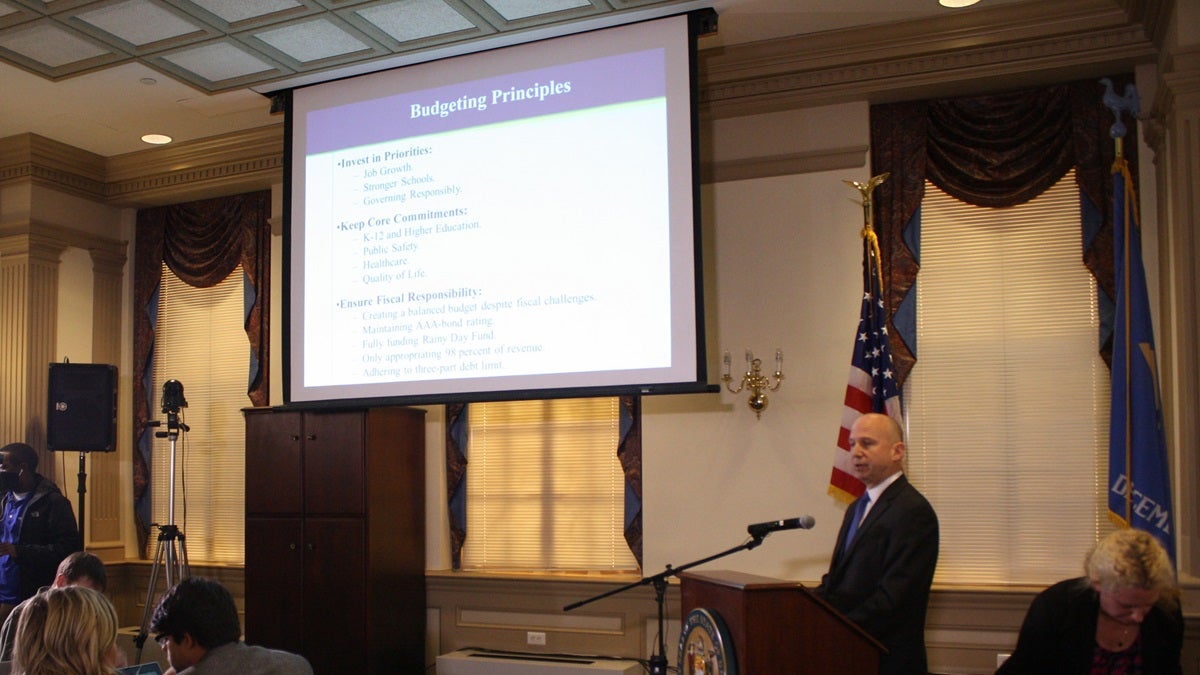Gov. Markell details Delaware’s “very difficult” budget [video]

Gov. Jack Markell presents his FY16 budget in Dover. (Photo courtesy of Markell Administration)
It’s another tight budget year for the First State as Markell‘s spending plan is just 2.37 percent.
The low level of growth in the $3.9 billion budget Markell presented to lawmakers on Thursday continues a trend started when he took office in 2009. The average annual budget growth in Markell’s two terms in office has been just 2.21 percent.
“This is a very difficult budget,” Markell said. “There is not a proposed pay increase for our very hard working state employees.”
Mandatory spending increases due to things like more students in state schools or increases in state employee health care account for the biggest bulk of the budget increase. There are 110 new teacher units that will be created within the Education Dept., which will cost an extra $15 million. Employee health care costs are up $37 million.
“In the area of personnel costs, we were looking at over $68 million of cost increases,” said state Budget Director Ann Visalli. “The total cost drivers that we were looking at were $153 million.”
New spending
One of the few areas of new spending stems from Markell’s pledge to improve the state’s support for those dealing with addiction.
The new budget calls for $4.5 million as part of that effort. That money would fund an increase in the number of sober living beds in the state from 60 to 120. The plan would also double the number of residential treatment beds for youths with opiate addictions.
“We have a crisis in this state,” Markell said. “We took a hard look over the last year at where we are, what a much better system looks like, what are the gaps, and what do we need to address it.”
Delaware ranks 10th in the nation for deaths by overdose and the number of heroin incidents reported by police has increased by more than 96 percent since 2008.
Reducing senior tax subsidy
Delaware’s relatively low property tax rates have been a big selling point for recruiting new residents to move in, especially for retirees. Currently, the over 65 population makes up 16.7 percent of state residents. By 2035, residents over 65 will make up 25 percent of the population. That boom in older residents is having a ripple effect on the state budget.
While seniors create more of a demand for services, they also get a break on a number of taxes. One of those tax breaks, the Elder Tax Subsidy cost the state $22 million in 2014, that’s more than double the $10.8 million it cost in 2004. By 2025, the subsidy is projected to cost the state $46.4 million.
“That is not sustainable, and frankly, is getting out of control,” Markell said. “When times were flush, there were significant benefits bestowed upon this population.” Markell said the cost of those benefits has been rising and will continue rising for years to come.
Currently the state pays $500 or 50 percent of seniors school taxes, whichever is less. Markell’s plan would reduce that amount to $250 or 25 percent. That would save the state $12.6 million
Capital spending
In addition to the $3.9 million operating budget, Markell also presented his $385.8 capital budget to fund construction projects around the state.
School construction projects total $89 million including money for major projects in the Caesar Rodney, Cape Henlopen, Delmar, Lake Forest, Milford, NCCo Vo-Tech, Polytech, Red Clay and Smyrna school districts.
Included in that capital spending plan is $10 million for a new container crane and other infrastructure improvements at the Port of Wilmington. The Riverfront Development Corporation in Wilmington would receive $3.15 million for projects at the riverfront.
There’s also $7 million for the first round of the Downtown Development District program approved for Wilmington, Dover and Seaford. There’s also $3 million for improvements to statewide trails and pathways and $5 million for libraries.
Next steps
The Joint Finance Committee will now take the budget proposal and hold its own series of hearings starting in February and going through mid-March. The budget must be approved by the end of the fiscal year on June 30.
WHYY is your source for fact-based, in-depth journalism and information. As a nonprofit organization, we rely on financial support from readers like you. Please give today.





